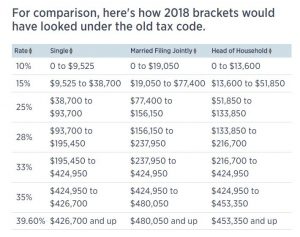Author: admin
IRS Said “2018 property taxes may be deductible only if assessed and paid in 2017”
The IRS said Wednesday that people may be able to deduct their 2018 state and local property taxes only if they were assessed and prepaid during 2017. The guidance comes after President Donald Trump last week signed into law sweeping tax reform legislation that caps how much in property taxes people can deduct. The key development from the IRS statement Wednesday is that people can only deduct prepaid property taxes that have already been assessed by local governments. Prepayments of anticipated property taxes will not be deductible. The tax law will allow taxpayers to claim a deduction of up to $10,000 , reflecting a combination of state and local income and sales taxes, plus property taxes.
10 Things About The New Tax Law
The Tax Cut and Jobs Act was passed by Congress and signed by President Trump. Here are the most important things that individual taxpayers need to know.
Certifying Acceptance Agent (CAA)
AJ Tax Services are now IRS CAA for ITIN, and process ITINs primarily for H1-B, L1 and F-1 visa holders’ families.
This means that we signed a contract with the Internal Revenue Service (IRS) ITIN office.
DO NOT confuse us with Acceptance Agents (AA) or basic tax preparers who have very limited or no authority
We are authorized agents by IRS ITIN office and we can issue Certificate of Accuracy (CoA) letter
ORDER IRS ACCOUNT TRANSCRIPT AND A COPY OF STATE TAX RETURNIRS
ORDER IRS ACCOUNT TRANSCRIPT AND A COPY OF STATE TAX RETURN
IRS ACCOUNT TRANSCRIPT INSTRUCTIONS:
To get transcript by mail, open following link;
Tax Fraud Alerts
Abusive Return Preparer
Taxpayers should be very careful when choosing a tax preparer. While most preparers provide excellent service to their clients, a few unscrupulous return preparers file false and fraudulent tax returns and ultimately defraud their clients. It is important to know that even if someone else prepares your return, you are ultimately responsible for all the information on the tax return.
Some of the most prevalent IRS impersonation scams:
Some of the most prevalent IRS impersonation scams include:
Requesting fake tax payments: The IRS has seen automated calls where scammers leave urgent callback requests telling taxpayers to call back to settle their “tax bill.” These fake calls generally claim to be the last warning before legal action is taken. Taxpayers may also receive live calls from IRS impersonators. They may demand payments on prepaid debit cards, iTunes and other gift cards or wire transfer. The IRS reminds taxpayers that any request to settle a tax bill using any of these payment methods is a clear indication of a scam. (IR-2016-99)
Targeting students and parents and demanding payment for a fake “Federal Student Tax”: Telephone scammers are targeting students and parents demanding payments for fictitious taxes, such as the “Federal Student Tax.” If the person does not comply, the scammer becomes aggressive and threatens to report the student to the police to be arrested. (IR-2016-107)
Sending a fraudulent IRS bill for tax year 2015 related to the Affordable Care Act: The IRS has received numerous reports around the country of scammers sending a fraudulent version of CP2000 notices for tax year 2015. Generally, the scam involves an email or letter that includes the fake CP2000. The fraudulent notice includes a payment request that taxpayers mail a check made out to “I.R.S.” to the “Austin Processing Center” at a Post Office Box address. (IR-2016-123)
Soliciting W-2 information from payroll and human resources professionals: Payroll and human resources professionals should be aware of phishing email schemes that pretend to be from company executives and request personal information on employees. The email contains the actual name of the company chief executive officer. In this scam, the “CEO” sends an email to a company payroll office employee and requests a list of employees and financial and personal information including Social Security numbers (SSN). (IR-2016-34)
Imitating software providers to trick tax professionals: Tax professionals may receive emails pretending to be from tax software companies. The email scheme requests the recipient download and install an important software update via a link included in the e-mail. Upon completion, tax professionals believe they have downloaded a software update when in fact they have loaded a program designed to track the tax professional’s key strokes, which is a common tactic used by cyber thieves to steal login information, passwords and other sensitive data. (IR-2016-103)
“Verifying” tax return information over the phone: Scam artists call saying they have your tax return, and they just need to verify a few details to process your return. The scam tries to get you to give up personal information such as a SSN or personal financial information, including bank numbers or credit cards. (IR-2016-40)
Pretending to be from the tax preparation industry: The emails are designed to trick taxpayers into thinking these are official communications from the IRS or others in the tax industry, including tax software companies. The phishing schemes can ask taxpayers about a wide range of topics. E-mails or text messages can seek information related to refunds, filing status, confirming personal information, ordering transcripts and verifying PIN information. (IR-2016-28)
If you receive an unexpected call, unsolicited email, letter or text message from someone claiming to be from the IRS, here are some of the tell-tale signs to help protect yourself.
The IRS Will Never:
Call to demand immediate payment using a specific payment method such as a prepaid debit card, gift card or wire transfer or initiate contact by e-mail or text message. Generally, the IRS will first mail you a bill if you owe any taxes.
Threaten to immediately bring in local police or other law-enforcement groups to have you arrested for not paying.
Demand that you pay taxes without giving you the opportunity to question or appeal the amount they say you owe.
Ask for credit or debit card numbers over the phone.
If you get a suspicious phone call from someone claiming to be from the IRS and asking for money, here’s what you should do:
Do not give out any information. Hang up immediately.
Search the web for telephone numbers scammers leave in your voicemail asking you to call back. Some of the phone numbers may be published online and linked to criminal activity.
Contact TIGTA to report the call. Use their “IRS Impersonation Scam Reporting” web page or call 800-366-4484.
Report it to the Federal Trade Commission. Use the “FTC Complaint Assistant” on FTC.gov. Please add “IRS Telephone Scam” in the notes.
If you think you might owe taxes, call the IRS directly at 800-829-1040.
If you receive an unsolicited email that appears to be from either the IRS or an organization closely linked to the IRS, such as the Electronic Federal Tax Payment System (EFTPS), report it by sending it to phishing@irs.gov
IRS Now Accepting ITIN Renewal Applications; Taxpayers Encouraged to Act Soon to Avoid Processing Delays in 2017
WASHINGTON — The Internal Revenue Service reminds taxpayers affected by recent changes involving the Individual Taxpayer Identification Number (ITIN) program that they can now begin submitting their ITIN renewal applications to the IRS.
Under the Protecting Americans from Tax Hikes (PATH) Act of 2015 passed by Congress and signed into law last year, any ITIN not used on a federal tax return at least once in the last three years will no longer be valid for use on a tax return as of Jan. 1, 2017.
If a taxpayer has an ITIN that is scheduled to expire and needs to file a tax return, it’s important not to delay. By submitting the application package in the next few weeks ITIN taxpayers may avoid unnecessary delays and allow for smoother and faster processing.
As part of this effort, the IRS has embarked on a wider education effort to share information with ITIN holders. To help taxpayers, the IRS has prepared a variety of informational materials, including flyers and fact sheets, available in several languages on IRS.gov. In addition to English and Spanish, materials are available in Chinese, Korean, Haitian Creole, Russian and Vietnamese.
The IRS continues to work with partner groups and others in the ITIN community to share information widely about these important changes.
ITINs are used by people who have tax filing or payment obligations under U.S. law but who are not eligible for a Social Security Number. ITIN holders who have questions should visit the ITIN information page on IRS.gov and take a few minutes to understand the guidelines.
Who Should Renew an ITIN
Only ITIN holders who need to file a tax return in 2017 need to renew their ITINs. Taxpayers will need to have a current ITIN in order to file a federal return in 2017. Others do not need to take any action.
Taxpayers with ITINs that haven’t been used on a federal income tax return in the last three years won’t be able to file a return unless their ITINs are renewed.
ITINs with the middle digits 78 or 79 (xxx-78-xxxx; xxx-79-xxxx) need to be renewed even if the taxpayer has used it in the last three years. The IRS recently mailed more than 300,000 letters (also available in Spanish on IRS.gov) alerting taxpayers with ITINs with middle digits of 78 or 79 of the need to renew their ITINs.
Taxpayers with an ITIN with middle digits of 78 or 79 have the option to renew ITINs for their entire family at the same time. Those who have received a renewal letter from the IRS can choose to renew the family’s ITINs together even if family members have an ITIN with middle digits other than 78 or 79. Family members include the tax filer, spouse and any dependents claimed on the tax return.
How to Renew an ITIN
To renew an ITIN, a taxpayer must fill out a Form W-7 and submit all required documentation. The IRS began accepting ITIN renewals on Oct. 1. There are three ways to submit the W-7 application package:
Mail the Form W-7 — along with original identification documents or copies certified by the agency that issued them — to the IRS address listed on the Form W-7 instructions. The IRS will review the identification documents and return them within 60 days.
Taxpayers have the option to work with Certified Acceptance Agents (CAAs) authorized by the IRS to help taxpayers apply for an ITIN. CAAs will review all documentation for a taxpayer and certify that an ITIN application is correct before submitting it to the IRS for processing. A CAA can also certify passports and birth certificates for dependents. This saves taxpayers from mailing original documents to the IRS.
In advance, taxpayers can call and make an appointment at a designated IRS Taxpayer Assistance Center in lieu of mailing original identification documents to the IRS.
A federal tax return need not be attached to the Form W-7 application if an ITIN is being renewed. However, taxpayers must still note a reason for needing an ITIN on the Form W-7. See the Form W-7 instructions for detailed information.
What documents do I need to prepare my tax return?
This is one of the most frequently asked questions by tax filers.
Regular customers have been through our process before and may have a pretty good idea about what we will need to get your tax return completed quickly and accurately. But regardless of whether you are a new or returning client you still may be confused about which documents to gather for your tax appointment. That’s why we have created this list to help you put your documents together, to make sure your appointment goes smoothly.
You’d Need to Earn This Much to Be in the Top 1%, 5%, 10%, 25%, or 50% in the U.S.
Curious how your income and tax burden stacks up next to other Americans? This 2013 data from the IRS should answer all of your questions.


